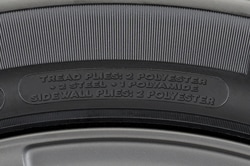Though tires may look simple on the outside, they are actually complex laminate structures made up of over 100 individual parts. The individual parts of a tire include steel, textiles and multiple rubber compounds, and they must all work together to achieve many, often conflicting, performance goals. Extensive engineering involving computer simulation, real-world testing and trial and error is invested in the design and manufacture of modern tires, and the information branded on a tire's sidewall provides a glimpse into what lies beneath the surface.
The branding on the sidewall of a tire is required to list the materials and number of layers of each material used to reinforce the rubber.
A typical tire's basic construction materials are usually presented as follows:
TREAD PLIES: 2 POLYESTER + 2 STEEL+1 POLYAMIDE
SIDEWALL PLIES: 2 POLYESTER
The branding in this example identifies that molded into the rubber under the centerline of the tread lies two radial body plies of polyester cord, two belts of angled steel cord and one circumferential cap ply of polyamide cord. It also identifies that in each sidewall at the widest points between the tire's inner and outer sidewalls (tire section width) lies two radial body plies of polyester cord (a continuation of the same two body plies that were listed under the centerline of the tread).
There are many more components inside that aren't branded on the tire sidewall. Many high-speed tires use circumferential reinforcements above the steel belts. These are either in the form of belt edge strips (approximately 1-inch wide bands covering only the inner and outer edges of the steel belts), full cap plies (covering the entire width of the steel belts) or a combination of both. However, because belt edge strips are not present under the centerline of the tread, they are never reflected in the basic construction material's branding for the tread area.
Many ultra high performance tires also use fabric or steel cord reinforced sidewalls to improve steering response and cornering stability. However, because sidewall-reinforcing material is not present at the widest points of the tire's sidewalls, they are never reflected in the basic construction materials branding for the sidewall area.
Was this post helpful?
288 of 1172 people found this post helpful




